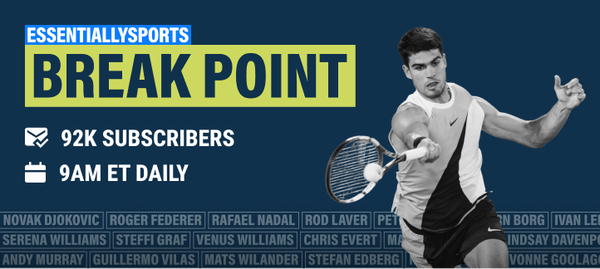
Imago
Roger FEDERER Switzerland during his semi final loss during the Nitto ATP, Tennis Herren Finals Tennis London Day 6 at the O2, London, England on 15 November 2019. Copyright: xAndyxRowlandx PMI-3201-0026

Imago
Roger FEDERER Switzerland during his semi final loss during the Nitto ATP, Tennis Herren Finals Tennis London Day 6 at the O2, London, England on 15 November 2019. Copyright: xAndyxRowlandx PMI-3201-0026

Imago
Roger FEDERER Switzerland during his semi final loss during the Nitto ATP, Tennis Herren Finals Tennis London Day 6 at the O2, London, England on 15 November 2019. Copyright: xAndyxRowlandx PMI-3201-0026

Imago
Roger FEDERER Switzerland during his semi final loss during the Nitto ATP, Tennis Herren Finals Tennis London Day 6 at the O2, London, England on 15 November 2019. Copyright: xAndyxRowlandx PMI-3201-0026
With a career that boasts 20 Grand Slam titles, 103 ATP singles trophies, and an astounding 310 weeks ranked as the world’s number-one player, Roger Federer’s name is synonymous with tennis excellence and longevity. But who would have thought that even a player of his caliber would have some unfinished business?
Watch What’s Trending Now!
“The 2009 US Open final against Juan Martín del Potro,” he told the Swiss daily newspaper, Tages-Anzeiger, in a new interview. “I should have won that one.
“Back then I had back pain in the warm-up and then missed so many chances. That was one of the matches I shouldn’t have lost. It also broke my streak at the US Open.”
The loss to del Potro remains uniquely painful, a solitary blemish on an otherwise spectacular chapter of his career. The context of the 2009 season makes this defeat especially poignant. That year had been a monumental one for Federer; he had finally captured the French Open to complete the career Grand Slam, reclaimed the world No. 1 ranking, and broken Pete Sampras’ record for most major singles titles by winning Wimbledon.
But against 20-year-old del Potro, Federer’s five-year domination of the US Open title came to an end. He was beaten 3-6, 7-6, 4-6, 7-6, 6-2 at Flushing Meadows.
What’s interesting is that del Potro was quite nervous initially, but somehow found the courage to stay on track and deny Federer what would have been his 16th major crown.
Del Potro’s victory was the first one by an Argentine man in New York since Guillermo Vilas won in 1977. It was a long battle that went on for 4 hours and 6 minutes and ended with happy tears. His win broke the illusion that 28-year-old Federer would continue winning the tournament.
Federer had previously lost against another Argentine, David Nalbandian. Regardless, the loss to del Potro is something he still remembers today. Similarly, he also remembers how certain transitions in his career were difficult.
Roger Federer opened up about one of his toughest moments
In the same interview with Tages-Anzeiger, Roger Federer shared his thoughts on one of his toughest challenges in tennis.
“The most difficult thing for me was the transition from juniors to the pros. At first, it was super cool. Suddenly, I was in the locker room with Pete Sampras, Andre Agassi, Tim Henman, Yevgeny Kafelnikov, Carlos Moya, and others. And I thought: This is the best!
“But then everything got so serious. One guy wraps the grip tape around his racket with a grim expression, and you think: Oh God, he’s intense! Another walks past you without giving you a glance. And you think: He wants to win at all costs!
That was a particularly tough phase for him.
“When you travel a lot, lose often, and are as emotionally charged as I was, you think: I didn’t read the fine print in the tennis contract. It’s not all fun and games. This seriousness got to me. The years from 18 to 20 or 21 were hard for me.”
Contrast this picture of the unflappable champion Federer would later become. In the end, it all turned out well for him. And at age 41, after a series of knee operations, he decided it was time for him to retire. By then, he had helped create a golden era of men’s tennis along with rivals Novak Djokovic and Rafael Nadal.



